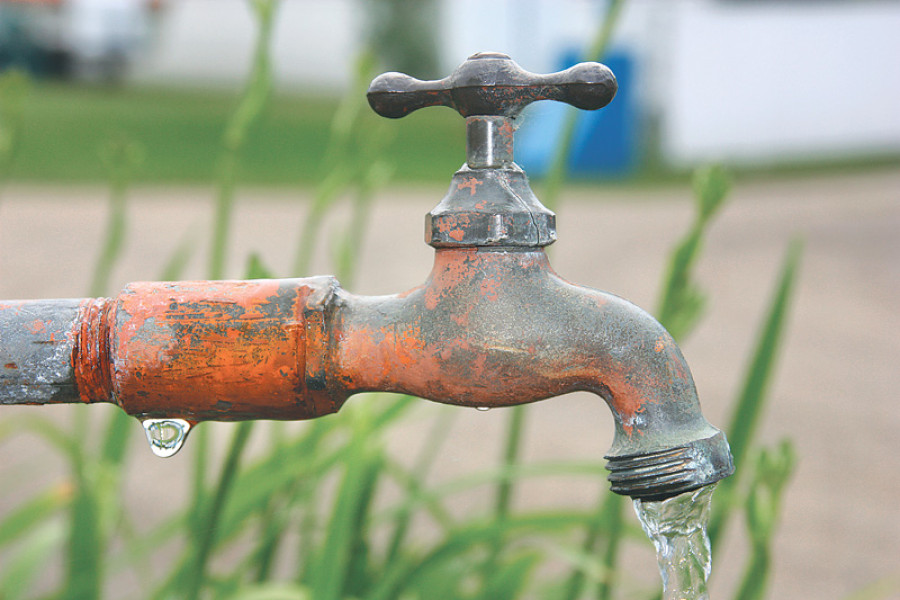Money
Govt considers offering KUKL’s shares to public
The government is considering on floating shares of Kathmandu Upatyaka Khanepani Limited (KUKL), the sole drinking water supplier in the Kathmandu Valley, to the public to raise a portion of funds required to complete the second phase of the Melamchi Drinking Water Project.
Rupak D. Sharma
The government is considering on floating shares of Kathmandu Upatyaka Khanepani Limited (KUKL), the sole drinking water supplier in the Kathmandu Valley, to the public to raise a portion of funds required to complete the second phase of the Melamchi Drinking Water Project.
The plan has been made public at a time when questions have been raised over KUKL’s ability to deliver quality service once 170 million litres of water starts flowing into the water-starved Valley per day from next year upon completion of the first phase of the Melamchi project.
“We are aware that existing problems at KUKL may hinder our plan to raise funds from the public,” said Bhim Prasad Upadhyaya, secretary of the Ministry of Water Supply and Sanitation, the parent body of KUKL, which owns 30 percent stake in the drinking water supplying company. “To sort this problem out, we are planning to send one of our senior staff to head the board of directors of KUKL.”
The representative of the Ministry of Water Supply, according to Upadhyaya, would remain as the chairman of KUKL till the time the company’s initial public offering is launched and remaining funds to complete the second phase of Melamchi project are raised from various sources, including multilateral lending institutions and other donor agencies.
“We hope this arrangement [appointment of senior government official as chairman of KUKL] would help build confidence of the investors,” he said.
This move may come as a blow to the private sector, whose representative is currently heading board of directors of KUKL-a public-private initiative. But unfortunately the private sector representative at KUKL is being deemed as “divisive and inefficient”.
KUKL’s board of directors is currently being headed by Suresh Kumar Basnet, a representative of the Nepal Chamber of Commerce, a private sector umbrella body, which owns 9 percent stake in the water supplying company.
But since Basnet assumed the position in June 2014, KUKL has faced “delays in decision making processes” because of his “high-handed conduct”, which, according to officials, is preventing the management from executing various plans, such as hiring new staff and holding annual general meeting.
Basnet is also accused of “using political influence to compel the board members to take decisions to suit his needs”, and “intervening in the company’s general manager selection process to appoint his candidate for the post.”
Tired of this attitude, KUKL board members relieved him from his duty in May 2015 by approving a no-confidence motion filed against him.
Basnet then moved the then Patan Appeals Court claiming his dismissal was illegal. But the court upheld the decision made by the board.
Basnet then took the case to the Supreme Court around one-and-a-half years ago, which issued a stay order, barring KUKL from immediately removing him. The hearing on this pending case has been postponed for around 18 times since it was first filed.
This implies the government may not be able to substitute Basnet with its official unless he steps down voluntarily or the Nepal Chamber of Commerce, which sent him, recalls him.
Basnet, according to officials of the Ministry of Water Supply, however, has indicated that he would step down once the upcoming annual general meeting (AGM) is over. The Post, however, could not verify this statement independently, as he could not be contacted.
“So, the upcoming AGM will clarify a lot of things,” said Upadhyaya. KUKL is yet to hold annual general meetings of fiscal years 2013-14, 2014-15 and 2015-16. It had recently decided to hold annual meetings of fiscal years 2013-14 and 2014-15 within January 21.
But reliable sources told the Post the meeting is likely to be postponed. Such delays will ultimately hit plans to raise funds to complete second phase of the Melamchi Drinking Water Project.
Melamchi project, which invested around Rs19 billion during the first phase, may require at least Rs20 billion to complete the second phase of works. “But this is a rough estimate,” said Ramakanta Duwadi, deputy executive director of the Melamchi Drinking Water Project. “We will get final cost estimate once detailed project report of the second phase is prepared.”
This report will most likely be prepared in 2017. “We then expect to begin construction in 2018 and complete it within next four to five years,” said Duwadi.
Melamchi project, which, in the first phase, is bringing in around 170 million litres of water to the Valley per day from the Melamchi River in Sindhupalchok from October 2017, will pump in additional 340 million litres of water daily from Yangri and Larke rivers after construction of the second phase is over.
So far, the Asian Development Bank (ADB) has pledged to extend $100 million to complete the second phase of project. “But the ADB’s contribution will not be sufficient,” said Water Supply Secretary Upadhyaya. “That’s why we will have to raise funds from the public and reach out to other donors, for which we will have to send our representative to lead KUKL’s board.”




 14.24°C Kathmandu
14.24°C Kathmandu















